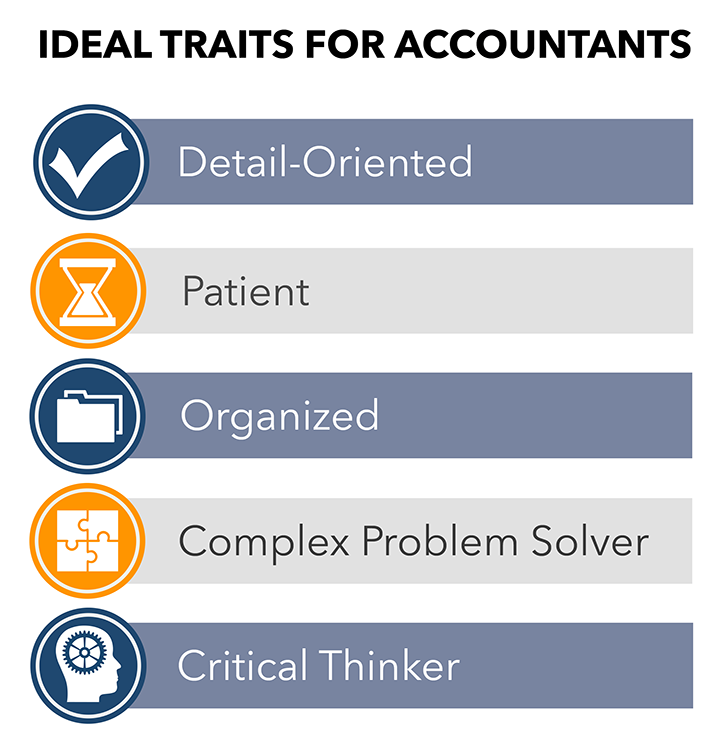If you’re still saying to yourself, “What is accounting” then you’ve come to the right place. It’s true that trying to navigate between the different types of accounting can get confusing. That’s why we’re laying out what accountants do, the steps you need to take to become one and the different types of certification that you may pursue for different careers in accounting.

What Does An Accountant Do?
So what is the typical day in the life of an accountant? This can vary, depending on your exact role. For example, as a public accountant your day would likely be spent preparing individual financial records and taxes, bookkeeping, auditing and providing consulting services to companies, corporations, non-profits or governments.
If you decide to go into management accounting, you would be responsible for preparing budgets and taxes and performing cost accounting, asset management and strategic planning to help manage the finances of a company.
Another route to go is internal audit accounting. In this case, your role would be to evaluate your organization’s financial information systems, internal controls, management procedures and operations to ensure that everything is running effectively and in compliance with regulations
You may also be interested in government accounting. If so, your daily tasks could include performing payroll, budgeting, managing revenues and expenditures and helping to ensure that government agencies are complying with the law when it comes to their accounting practices.
What Are the Steps to Becoming An Accountant?
Step One: Pursue your education[i]
According to the Bureau of Labor Statistics, most accountants need at least a bachelor’s degree in accounting or a related field. Certain employers may prefer to hire applications who’ve earned a masters degree in accounting or in business admin (with an accounting concentration). Gaining practical experience through internships with public accounting or business firms can also be a good way to gain experience and help improve your prospects.
Step Two: Determine your career path
As we mentioned above there are many different career paths to take within the field of accounting. This means you’ll need to look at your goals, strengths and weaknesses to determine which direction you’d like to pursue. For example, do you prefer working with taxes or analyzing management procedures? Are you proficient at bookkeeping or is auditing more your speed? Would you prefer to work for individuals, companies or the government? There are many things to consider and what you decide will affect the type of certification that you pursue.
Step Three: Earn your certification[ii]
According to the Bureau of Labor Statistics, all accountants who file reports with the Securities and Exchange Commission (SEC) are required to be Certified Public Accountants (CPAs). Other accountants may also choose to become a CPA to help enhance their credentials and job prospects. In order to become a CPA you must first pass a national exam and meet other state requirements.
Most states may require that you complete 150 semester hours of college coursework – which is 30 more hours than the typical 4-year bachelors degree program. In some states, you may also have to complete qualifying work experience (the amount can vary depending on where you live).
Every state requires that accountants take the four-part Uniform CPA Examination from the American Institute of Certified Public Accountants (AICPA). You don’t necessarily need to pass all four parts at once, but in most states you must pass them all within 10 months of completing the first part. Most states also require that you take continuing education to maintain your CPA certification.
Is a CPA my only accounting certification option?
You may be surprised to learn how many different types of accounting certification there are out there. Getting your CPA may be the most popular but it’s definitely not your only options. Take a look at the list of accounting certifications below to see if one of them seems like a good fit for you and your career goals.
Certified Management Account (CMA)
Pursuing your CMA certification may make sense if your goal is to take on a management role in an organization to help build quality financial practices and operations procedures.
Certified Financial Manager (CFM)
CFM designation may be a good choice if you’re looking to work with a corporate finance organization in areas such as financial markets, risk management, corporate restricting and investor relations.
Certified Government Financial Manager (CGFM)
Is your goal to work for the government? CGFM designation covers financial management for federal, state and local governments.
Certified Financial Planner (CFP)
CFP designation may be the right option for you if you’re looking to help clients to plan for retirement, manage and expand their assets, and develop a plan for their financial futures.
Certified Fraud Examiner (CFE)
If your goal is to work in fraud prevention, detection, and investigation than it makes sense to pursue your CFE so you can show your expertise in the anti-fraud field.
Enrolled Agent (EA)
Are taxes your thing? EA designation is provided by the IRS and it signifies specialization and competency in the field of taxation.
Certified Internal Auditor (CIA)
If you’re interested in analyzing opportunities, examining global issues, and assessing economy and efficiency for organizations it may make sense to pursue your CIA certification.
[i][ii] bls.gov/ooh/business-and-financial/accountants-and-auditors.htm#tab-4
